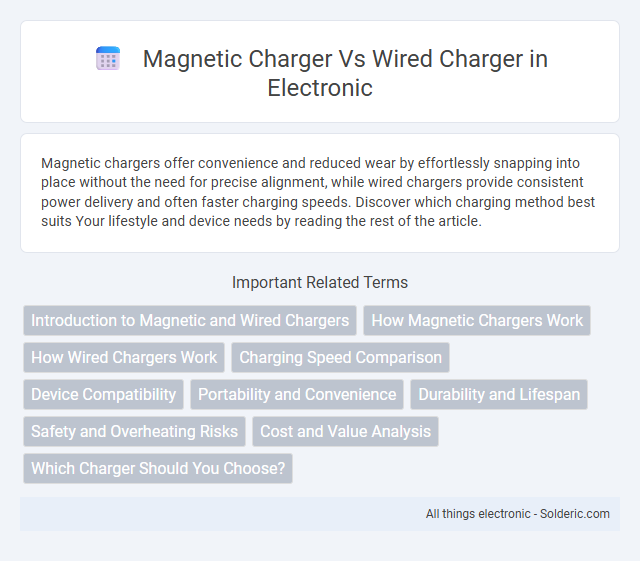Magnetic chargers offer convenience and reduced wear by effortlessly snapping into place without the need for precise alignment, while wired chargers provide consistent power delivery and often faster charging speeds. Discover which charging method best suits Your lifestyle and device needs by reading the rest of the article.
Comparison Table
| Feature | Magnetic Charger | Wired Charger |
|---|---|---|
| Connection Type | Magnetic attachment | Physical cable plug |
| Charging Speed | Moderate, varies by model | Faster, supports high wattage |
| Convenience | Easy snap-on; no cable fumbling | Requires cable connection |
| Durability | Less wear on device port | Port and cable prone to wear |
| Compatibility | Limited to specific devices | Universal with correct cable |
| Price | Higher cost | Generally lower cost |
| Use Case | Ideal for quick and frequent docking | Preferred for fast charging and data transfer |
Introduction to Magnetic and Wired Chargers
Magnetic chargers utilize electromagnetic fields to transfer power wirelessly, offering convenience by eliminating cable wear and connection issues common in wired chargers. Wired chargers provide a direct physical connection, delivering faster and more consistent charging speeds due to stable electrical conductivity. Your choice between magnetic and wired chargers depends on priorities such as portability, charging speed, and device compatibility.
How Magnetic Chargers Work
Magnetic chargers use a magnetic connection to align the charging cable with your device's charging port, ensuring a secure and effortless attachment. This technology employs electromagnetic induction to transfer power wirelessly, reducing wear and tear on charging ports compared to traditional wired chargers. You can experience more convenience and durability with magnetic chargers while maintaining efficient energy transfer during charging.
How Wired Chargers Work
Wired chargers transfer electrical energy directly through a cable, usually via USB or proprietary connectors, to charge devices efficiently with minimal energy loss. The physical connection ensures stable power delivery and faster charging speeds compared to magnetic chargers, which rely on magnetic alignment for power transfer. Wired chargers are compatible with a wide range of devices due to standardized cables and protocols such as USB Power Delivery (USB-PD).
Charging Speed Comparison
Magnetic chargers typically offer slower charging speeds compared to wired chargers due to lower power transfer efficiency and limited current capacity. Wired chargers provide faster charging capabilities by delivering a direct, stable electrical connection, often supporting higher wattage and rapid charging standards like Qualcomm Quick Charge or USB Power Delivery. For optimal charging speed, wired chargers remain superior, especially for devices requiring high power input.
Device Compatibility
Magnetic chargers offer broad device compatibility, particularly with smartphones that support wireless charging standards like Qi, enabling convenient attachment and charging without wear on ports. Wired chargers require specific connectors such as USB-C, Lightning, or Micro-USB, limiting compatibility to devices with matching ports and potentially necessitating multiple cables. Compatibility considerations also include charging speed and power delivery, where wired connections often provide faster, more consistent charging compared to some magnetic wireless setups.
Portability and Convenience
Magnetic chargers offer superior portability by eliminating the need for precise alignment, allowing users to quickly attach and detach devices without wear on charging ports. Wired chargers require direct connection, which can be less convenient in fast-paced environments and increase cable clutter. The magnetic design enhances user experience by providing a hassle-free, durable charging method ideal for on-the-go lifestyles.
Durability and Lifespan
Magnetic chargers typically offer enhanced durability by minimizing wear and tear on charging ports through easy attachment and detachment, reducing physical stress compared to wired chargers. Wired chargers, while generally more affordable, often experience cable fraying and connector damage over time, leading to shorter lifespans. High-quality magnetic chargers use robust connectors and reinforced cables, extending overall device charging system longevity significantly.
Safety and Overheating Risks
Magnetic chargers reduce the risk of overheating by automatically disconnecting when alignment is lost, preventing excess current flow and potential damage to devices. Wired chargers, while generally reliable, can experience issues such as frayed cables or poor connectors, increasing the risk of short circuits and overheating. Safety standards for magnetic charging often include built-in temperature sensors and automatic shutoff features, enhancing protection against overheating compared to traditional wired options.
Cost and Value Analysis
Magnetic chargers typically have a higher upfront cost due to advanced technology and convenience features, while wired chargers remain more affordable and widely accessible. Your decision should consider long-term durability and ease of use, as magnetic chargers reduce wear and tear on ports, potentially extending device lifespan. Evaluating both initial investment and added value helps determine which option aligns best with your budget and charging needs.
Which Charger Should You Choose?
Magnetic chargers offer convenience with effortless attachment and reduced wear on ports, making them ideal for daily use and travel. Wired chargers typically provide faster charging speeds and compatibility with a wider range of devices, ensuring reliable power delivery when time is critical. Your choice depends on whether you prioritize ease of use and device longevity or rapid charging performance.
magnetic charger vs wired charger Infographic

 solderic.com
solderic.com